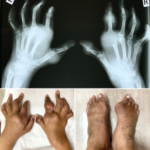McMahan et al. examined how abnormal gastrointestinal (GI) transit may contribute to GI severity and symptoms in patients with systemic sclerosis (SSc). About 90% of people with SSc have GI tract involvement, and understanding the connection between GI symptoms, their severity and abnormal GI transit may permit targeted therapeutic approaches for these patients.









